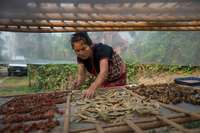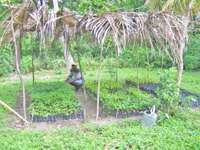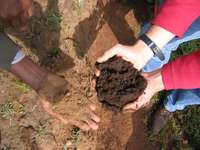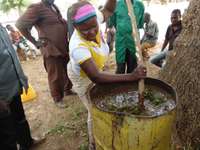Compassion International Agricultural Resources
This page is for Compassion International National Offices and Frontline Church Partners to access material specifially curated for your use. Currently highlighted resources are organized in the following four categories according to needs expressed by CI neighbours:
- Community seed bank development
- Tree nursery development
- Soil amendments
- Bio-pesticides and bio-fertilizers
There are an abundance of other resources available on ECHOcommunity (this website) outside of these four categories so please watch this video on how to utilize ECHOcommunity or view this page about ECHOcommunity features to learn how to search and navigate through ECHOcommunity to find what you need.
If you need resources on a specific topic and cannot find them, please email tru@echocommmunity.org to reach ECHO's Informational Resourcing Associate.
To submit an official training request, or to contact us with questions, please fill out this form.
The ECHOcommunity mobile app is a great way to use your mobile phone to access, download, and share resources as well as track crop information.
http://edn.link/android
or
http://edn.link/apple
Community Seed Bank Development
 Seeds naturally have a place in almost any endeavor having to do with agricultural development. Seeds represent the promise of a continued supply of food, nutrition, and ecosystem improvement for farmers. Seed sovereignty and access are vital to farm survival. Distributing improperly stored seeds that germinate poorly exposes farmers and communities to the risk of crop failure and culture and heritage loss. Seed banks create opportunities for smallholder farmers to produce, save, and share quality seeds that are desirable, affordable, and accessible to all. Seed banking at the community level supports the retention of valuable indigenous crop varieties and preserves genetic biodiversity. ECHO's informational and training resources focus on low-cost methods and appropriate technologies for multiplying, processing, and storing seeds of crops selected for their potential to succeed in local contexts. Examples of seed banking technologies promoted by ECHO include earthbag seed storage structures, the use of locally available desiccants, and vacuum sealing with modified bicycle pumps and syringes. ECHO staff are constantly innovating and researching aspects of seed saving and banking in the tropics.
Seeds naturally have a place in almost any endeavor having to do with agricultural development. Seeds represent the promise of a continued supply of food, nutrition, and ecosystem improvement for farmers. Seed sovereignty and access are vital to farm survival. Distributing improperly stored seeds that germinate poorly exposes farmers and communities to the risk of crop failure and culture and heritage loss. Seed banks create opportunities for smallholder farmers to produce, save, and share quality seeds that are desirable, affordable, and accessible to all. Seed banking at the community level supports the retention of valuable indigenous crop varieties and preserves genetic biodiversity. ECHO's informational and training resources focus on low-cost methods and appropriate technologies for multiplying, processing, and storing seeds of crops selected for their potential to succeed in local contexts. Examples of seed banking technologies promoted by ECHO include earthbag seed storage structures, the use of locally available desiccants, and vacuum sealing with modified bicycle pumps and syringes. ECHO staff are constantly innovating and researching aspects of seed saving and banking in the tropics.
Seed Bank Development Resources
Tree Nursery Development
 A nursery can be as small as a farmer’s seedbed for the immediate planting of a single crop or as large as a complex business with hundreds of species and varieties for sale to the public. Small-scale nurseries supply trees and other perennial plants for community use. Effective nurseries are tailored to meet specific needs of the communities they serve. Food security, for example, could be addressed by producing fruit trees. Nurseries can also meet needs for greater crop diversity, erosion control, livestock fodder and forage, fuelwood, income generation, nutrition, reforestation, decorative landscaping, and timber. ECHO’s resources and training focus on participatory approaches to establishing nurseries that fit the local context and maximize community assets. Topics include site selection, propagation material, options for growing media, and irrigation. More advanced subjects in nursery development, such as grafting, can be covered on an as-needed basis.
A nursery can be as small as a farmer’s seedbed for the immediate planting of a single crop or as large as a complex business with hundreds of species and varieties for sale to the public. Small-scale nurseries supply trees and other perennial plants for community use. Effective nurseries are tailored to meet specific needs of the communities they serve. Food security, for example, could be addressed by producing fruit trees. Nurseries can also meet needs for greater crop diversity, erosion control, livestock fodder and forage, fuelwood, income generation, nutrition, reforestation, decorative landscaping, and timber. ECHO’s resources and training focus on participatory approaches to establishing nurseries that fit the local context and maximize community assets. Topics include site selection, propagation material, options for growing media, and irrigation. More advanced subjects in nursery development, such as grafting, can be covered on an as-needed basis.
Tree Nursery Development Resources
Soil Amendments (including GMCC and Foundations for Farming)
 A soil's chemical, physical, and biological properties dictate how well plants are likely to grow in it. Soils in the tropics are often exposed to intense sun and alternating periods of drought and high rainfall. Tropical soils are commonly degraded to the point where they can no longer sustain crop growth. However, there are inputs and strategies for restoring and maintaining soil health and productivity to be favorable for plant growth. ECHO encourages farmers never to give up hope on their soil and provides an array of options to help ameliorate poor soil conditions. As long as there is sufficient soil depth to accommodate crop roots, amendments and management practices can be adopted that transform soil into a substrate in which plants not only survive but thrive. Even naturally infertile soils and soils with very low water-holding capacity can become more productive with proper management and inputs over time. ECHO values organic matter retention, crop diversification, and minimal tillage for improving and maintaining soil health while minimizing reliance on capital-intensive inputs. ECHO’s resources and training cover topics focus on long-term soil health, covering topics such as farmer-made fertility inputs, green manure/cover cropping (GMCC), Foundations for Farming, mulching, composting, and many others, depending on the assets, context, and needs.
A soil's chemical, physical, and biological properties dictate how well plants are likely to grow in it. Soils in the tropics are often exposed to intense sun and alternating periods of drought and high rainfall. Tropical soils are commonly degraded to the point where they can no longer sustain crop growth. However, there are inputs and strategies for restoring and maintaining soil health and productivity to be favorable for plant growth. ECHO encourages farmers never to give up hope on their soil and provides an array of options to help ameliorate poor soil conditions. As long as there is sufficient soil depth to accommodate crop roots, amendments and management practices can be adopted that transform soil into a substrate in which plants not only survive but thrive. Even naturally infertile soils and soils with very low water-holding capacity can become more productive with proper management and inputs over time. ECHO values organic matter retention, crop diversification, and minimal tillage for improving and maintaining soil health while minimizing reliance on capital-intensive inputs. ECHO’s resources and training cover topics focus on long-term soil health, covering topics such as farmer-made fertility inputs, green manure/cover cropping (GMCC), Foundations for Farming, mulching, composting, and many others, depending on the assets, context, and needs.
Bio-pesticides and Bio-fertilizers

Bio-pesticide Resources Bio-fertilizer Resources
- This page is for Compassion National Offices and International Frontline Church Partners to access material specifially curated for your use. Currently highlighted resources are organized in the following four categories according to needs expressed by CI neighbours: Community seed bank...